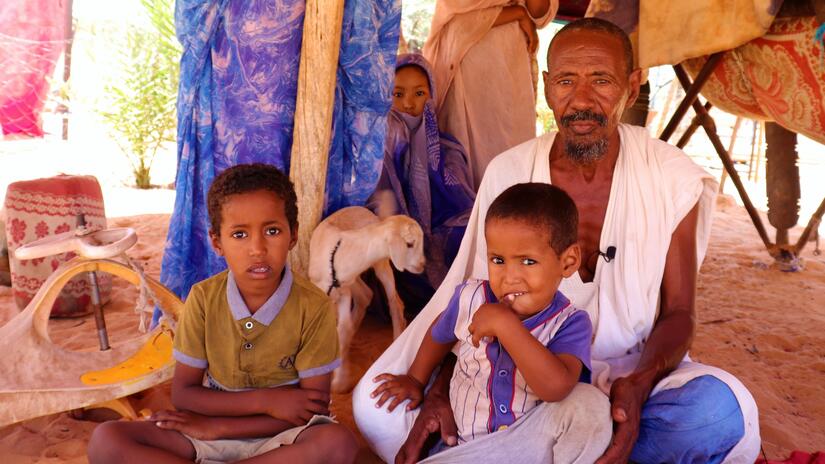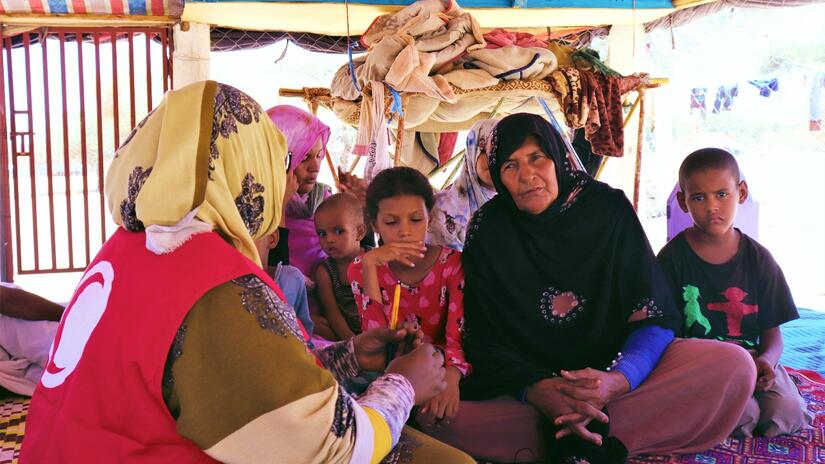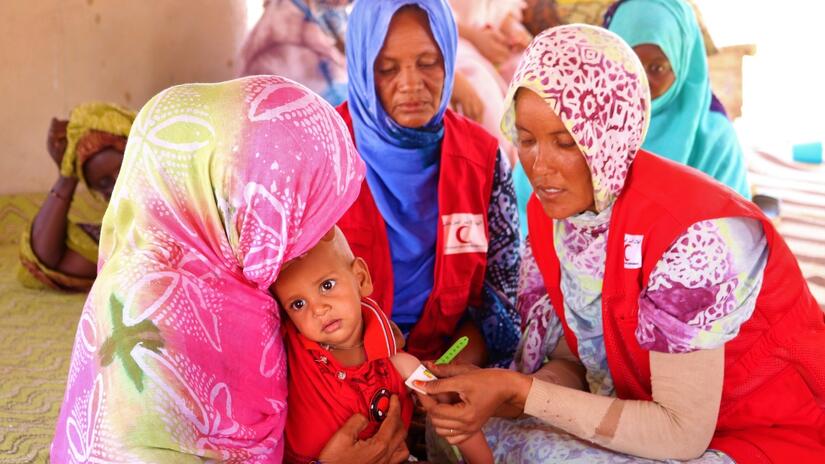It's hot and dry in N'Beika, a commune in Moudjeria, central Mauritania, with temperatures already rising above 40°C by late morning. It’s hard to believe that nine months ago, 90% of the commune was submerged by heavy rainfall and flooding.
Mohamed Lemine Ould Mohamed Moctar, a 65-year-old farmer and father of seven, looks out over his piece of land, his face distant, hoping for a good rainy season, this time.
"I didn't harvest anything last year. My whole sorghum field was ravaged by the floods. At least the year before, I was able to harvest a few small bags, despite the lack of rain", says Mohamed.

Mohamed, a father of seven, sits with three of his children in Moudjeria, Mauritania where many people are struggling to feed their families due to flooding in 2022 that wiped out people's crops.
Photo: IFRC
Here in Moudjeria, as in Guerrou and Barkeol, the two other departments most affected by food insecurity in Mauritania this year, most families depend on traditional farming and livestock rearing to get by—a situation that makes them highly dependent on rainfall.
For years, a lack of water had been the main obstacle to flourishing agriculture in this community nestled on a plateau some 100 metres above sea level. But last year's rains were much heavier than expected, causing flooding that wiped out people’s crops.
This flooding has put severe strain on people’s livelihoods and is plunging many families in Mauritania into food insecurity. According to the March 2023 Mauritania Harmonized Framework, close to 500,000 people are expected to be acutely food insecure in the current lean season between June and August 2023.
“Every day is battle for us to survive. Cereal, meat, and basic food stuff to feed my family are almost unaffordable since I lost my only hope for income in this past flood,” adds Mohamed.
Sadly, communities in Mauritania are not the only ones facing this problem. The Sahel Region in Sub-Saharan Africa is experiencing one of the worst food insecurity crises in decades, affecting millions of people.
“It’s alarming to witness the deterioration in food security in the Sahel. Pre-existing conditions such as drought and floods, climatic shocks, regional and international conflicts and rising food and fuel prices are spiking hunger and malnutrition rates. Each time, it is the most vulnerable who suffer the consequences of a complex context, exacerbated by growing inequalities,” says Alexandre Claudon de Vernisy, head of the IFRC Cluster delegation for Cape Verde, Gambia, Mauritania and Senegal.

A Mauritanian Red Crescent volunteer speaks to widow, Zeinab, in N'Beika, Mauritania, who currently relies on relatives to survive and feed her children during a period of food insecurity in the country.
Photo: IFRC
In response to this emergency, the IFRC launched an appeal for 215 million Swiss francs in October 2022 to support 7.6 million of the most food insecure people across 14 priority countries in Sub-Saharan Africa. Mauritania is the latest country to join the regional appeal in May 2023, bringing the total number of countries to 15.
The Mauritanian Red Crescent (MRC) needs 2 million Swiss francs from this appeal to help more than 80,000 people like Mohamed affected by food insecurity in the communes of Barkeol, Guerrou and Moudjeria.
In the short term, this funding will be used to provide more than 2,700 families with cash assistance to help them get back on their feet. It will also enable MRC volunteers to provide community health services and malnutrition screenings to more than 2,500 families to meet their immediate health needs.
In the longer-term, the funding aims to boost the resilience of communities in Mauritania so they are better prepared for future climate shocks. The MRC will:
- Set up three ‘Farmer Field Schools’ to teach climate-smart farming techniques—such as soil moisture conservation, use of appropriate seeds, and crop association—to hundreds of farmers, so they can have more successful and reliable yields.
- Help 30 villages to set up village food security stocks by buying cereals after the harvest period so that the price is cheaper during the next lean season.
- Support mother’s clubs in the region that help mothers to recognize and fight signs of malnutrition in their children.
"It’s a long and difficult lean season ahead of us. Without the Red Crescent’s help, there would be very little hope for us," says Mohamed.
--
For more information about this crisis and to donate to the IFRC’s emergency appeal, please visit our Africa: Hunger crisis page.





